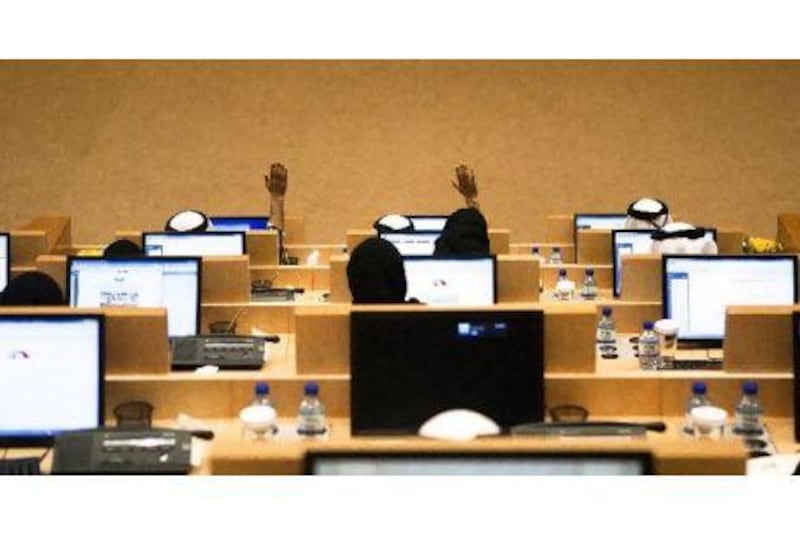ABU DHABI // As the newly elected members of the FNC prepare to take their seats, former members have urged them to make sure they are ready for the job.
That means keeping a copy of the UAE Constitution near by and being prepared to build on the council's previous work, they say.
"They need to read the Constitution," said Khaled Al Falasi, a former Dubai member who chaired the council's foreign relations and mineral resources committee. "They must know all of it, all of the articles."
Fatima Al Marri, another former Dubai member, said the Constitution was the FNC members' "weapon in the council. It explains the role of the FNC clearly".
Mr Al Falasi said it was important for new members to continue the work of the previous councils by reviewing all sessions, and to constantly follow up on their recommendations.
"They need to know all our previous sessions so that they do not start from zero," he said.
"They need to not ignore previous recommendations. Follow them or update them, or work on things the council didn't work on before.
"New members need to follow on so that the council's previous work does not dissolve at the end of every term. They need to start where the previous session ended." And once they begin "heated" discussions, the members have three tools at their disposal, Mr Al Falasi said.
"One, law amendments or pushing for new laws; two, issues they want to discuss; and three, questions to ministers," he said.
"These are the three means they will have. They must take advantage of all of them."
Mr Al Falasi said the new members should not forget the promises they made to be elected.
"When addressing issues, they should introduce their own programmes too," he said.
Rashid Al Marar, a former member for Abu Dhabi, said councillors also needed to know when to use the media.
"[It] helps an idea to live on beyond the FNC chambers," Mr Al Marar said.
"They support what you say. With no media the idea completely dies. The FNC member should not be afraid of media. They should say what is right."
Ahmed Al Khateri, a former Ras Al Khaimah member who chaired the council's legislative and legal affairs committee, advised new members to ensure they were well briefed when questioning ministers.
"When presenting figures, they need to make sure they are all accurate," Mr Al Khateri said. "And when addressing issues in ministries, they should tackle big issues, not daily mistakes."
In this, the Audit Bureau's reports were a great help, he said.
"It is our primary source of information," Mr Al Khateri said.
"Their reports have important numbers, no one can argue with them because they are extremely credible."
But Mr Al Falasi said he would like to see the Audit Bureau work more closely with the FNC.
"They should not wait for us to ask for these reports," he said. "They should do monthly reports and give them to the council. Sometimes they used to be … a year late. This must change."
Mr Al Falasi said statistics and evidence of official wrongdoing were the most important parts of the reports.
"Sometimes ministries need to overrule laws for a short period. The report also includes this," he added. "Without the reports, the members could struggle."
Ms Al Marri had particular advice for female successors. They should be confident in their position as equal members of the council.
Only one woman was elected this time but more will probably be among the members appointed by the rulers.
The first session of the new FNC has still not been officially summoned but the Constitution requires it to be in the third week of this month.
And Mr Al Falasi had one final piece of advice for the new members: they should remember that it was "an honour to be part of the council".
"They now have a responsibility: they must address issues concerning the rich and the poor in the country."






